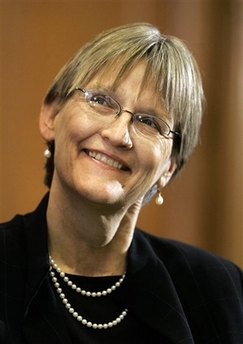Harvard names first woman president
(AP)Updated: 2007-02-12 07:10 CAMBRIDGE, Mass. - Harvard University on Sunday named historian Drew Gilpin Faust as its first female president, ending a lengthy and secretive search to find a successor to Lawrence Summers and his tumultuous five-year tenure.
The seven-member Harvard Corporation elected Faust, a noted scholar of the American South and dean of Harvard's Radcliffe Institute for Advanced Study, as the university's 28th president. The board of overseers recommended her for the post.
 Newly appointed President of Harvard University Drew Gilpin Faust listens to introductions at a news conference at Harvard in Cambridge, Mass., Sunday, Feb. 11, 2007. [AP] |
"I hope my appointment can be one symbol of an opportunity that would have been inconceivable even a generation ago," she said at a news conference. But, she added, "I'm not the woman president of Harvard, I'm the president of Harvard."
With Faust's appointment, half of the eight Ivy League schools will have a woman as president. Her selection is noteworthy given the uproar over Summers' comments that genetic differences between the sexes might help explain the dearth of women in top science jobs, comments which sparked debates about equality at Harvard and nationwide.
Faust oversaw the creation of two faculty task forces, formed in the aftermath of Summers' remarks, to examine gender diversity at Harvard. She has been dean of Radcliffe since 2001, two years after the former women's college was merged into the university as a research center with a mission to study gender issues.
"This is a great day, and a historic day, for Harvard," said James R. Houghton, chairman of the presidential search committee.
Some professors have quietly groused that ¡ª despite the growing centrality of scientific research to Harvard's budget ¡ª the 371-year-old university is appointing a fifth consecutive president who is not a scientist. No scientist has had the top job since James Bryant Conant retired in 1953; its last four have come the fields of classics, law, literature and economics.
Faust is the first Harvard president who did not receive an undergraduate or graduate degree from the university since Charles Chauncy, an alumnus of Cambridge University in England, who died in office in 1672. She attended Bryn Mawr College and the University of Pennsylvania, where she was also a professor of history.
Faust pivots from managing Radcliffe, a think-tank with 87 employees and a $17 million budget, to presiding over Harvard's 11 schools and colleges, 24,000 employees and a budget of $3 billion. The Harvard presidency is perhaps the most prestigious job in higher education, offering a pulpit where remarks resonate throughout academic circles and unparalleled resources, including a university endowment valued at nearly $30 billion.
"Faculty turned to her constantly as someone whose opinion is to be trusted," said Sheldon Hackney, a former president of The University of Pennsylvania and southern historian who worked closely with Faust. "She's very clear, well-organized. She has a sense of humor, but she's very even-keeled. You come to trust in her because she's so solid."
In Faust, Harvard not only has its first female leader, but a president who has candidly discussed her feminist ideals in a memoir, "Shapers of Southern History: Autobiographical Reflections."
Born Catherine Gilpin in the Jim Crow era, to a privileged family in Virginia's Shenandoah Valley, Faust wrote that a conversation at age 9 with the family's black handyman and driver inspired her to send a letter to President Eisenhower pleading for desegregation.
She then began to question the rigid Southern conventions where girls wore "scratchy organdy dresses" and white children addressed black adults by their first names.
"I was the rebel who did not just march for civil rights and against the Vietnam War but who fought endlessly with my mother, refusing to accept her insistence that 'this is a man's world, sweetie, and the sooner you learn that, the better off you'll be,'" she writes.
Faust joins an exclusive roster of former Harvard presidents that have included colonial clergymen, Bay State patricians and a cabinet secretary. Former President Derek Bok has been leading the university this academic year on an interim basis.
While the presidential search was marked by disciplined secrecy ¡ª committee members met behind closed doors in a Georgian mansion and were quietly ushered away in idling Lincoln Town Cars ¡ª it also revealed an embarrassing trend: several top-tier candidates said they weren't interested.
In January, Thomas R. Cech, head of the Howard Hughes Medical Institute and a Nobel prize winner, asked the search committee to remove him from consideration. The presidents of Columbia, Brown and Princeton all said they did not want the job.
|
||
|
||
|
|